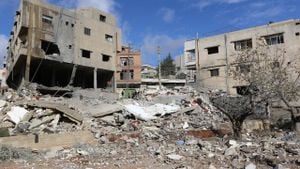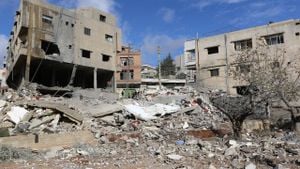Chinese military officials have recently faced significant upheaval, as the country's defense leadership continues to grapple with mounting corruption allegations. The recent suspension of Miao Hua, who until now was the chief of the Central Military Commission, has highlighted the depth of these issues within the People's Liberation Army (PLA). Concern over integrity and discipline appears to have prompted this decisive action from the Chinese authorities.
Miao Hua’s dismissal, announced by Wu Qian, the spokesperson for the Ministry of National Defense, marks yet another episode in the broader anti-corruption campaign initiated by President Xi Jinping over the past decade. According to Wu, Miao has been suspended pending investigation due to suspected “serious violations of discipline”—a phrase often used by Chinese officials when referring to corruption-related allegations.
The investigations are not new but have escalated rapidly. Reports indicate at least nine generals and numerous executives involved with defense contracts have been ousted from their positions under Xi’s stringent anti-graft measures. This wave of scrutiny was sparked to identify and eliminate corruption within the ranks, especially after multiple top officials were reported to have engaged in illicit activities, including bribery and mishandling military resources.
Meanwhile, the Ministry of Defense has refuted claims surrounding Defense Minister Dong Jun being investigated for corruption—a rumor circulating after he recently declined to meet U.S. Defense Secretary Lloyd Austin during discussions at the ASEAN meeting. Mao Ning, spokesperson for the Foreign Ministry, slammed reports as “chasing shadows,” dismissing them outright and asserting the country’s discontent with what they termed slanderous behavior toward Chinese officials.
Dong's appointment as defense minister came after the sudden dismissal of his predecessor, Li Shangfu, who, after only seven months on the job, was expelled from the Communist Party over suspected bribery. This situation adds to the unsettling narrative of rapid turnover among China’s military leaders, with three consecutive defense chiefs now rumored to be embroiled in corruption investigations, raising questions about the military's operational stability at a time of heightened geopolitical tensions.
Li’s removal was part of Xi Jinping’s broader anti-corruption campaign, which has seen sweeping changes within the military structure. Notably, his predecessor, Wei Fenghe, also faced similar fates of being removed over alleged graft, establishing what many critics see as a troubling pattern of instability at the highest echelons of the PLA's leadership.
Commentators are dissecting this string of military purges as indicators not only of deep-seated corruption but also as elements of Xi’s strategy to assert control within the military apparatus, consolidations of power aimed at fortifying his political standing amid challenges from both domestic and international fronts. The effectiveness of the military is of utmost importance for Xi’s government, especially as China works to position itself as a dominant military power.
Xi's regime has focused on transforming the military, emphasizing the need for modernization and operational readiness to match the U.S. as it engages more assertively on the world stage. During this challenging process, Xi has faced the dual task of legitimizing military leadership and purging corruption.
The frequency of these investigations and suspensions can lead to speculation about the internal environment within the PLA and Xi's confidence levels concerning his military personnel's loyalty. The significant alterations within the military's leadership structure continue to generate doubts, especially as they are juxtaposed with incidents of heightened military tensions, particularly concerning Taiwan and the South China Sea.
Failure to establish effective, stable leadership could undermine China’s military ambitions just as its leaders seek to engage effectively with global military power dynamics. It could also signal to neighboring countries, as well as adversaries, to question the reliability of China's military capabilities. Such perceptions matter critically for the region's geopolitical landscapes.
Continuing reports of corruption within the PLA come amid news of Dong’s appointment not fully alleviating international concerns. Recent engagements between the U.S. and China at military levels have been carefully observed, and Dong’s immediate predecessors had both established communication channels with the Pentagon. Still, the current investigation obscures the luster of military diplomacy at this moment of volatility.
What remains to be seen is how effective the recent reforms and strategies will be against the backdrop of these corruption scandals. The current investigations grapple with the dual challenge of maintaining operational secrecy and coherence within the command structure, which could well be disrupted by leaks and administrative shakeups. Understanding the balance within the PLA will be pivotal for both regional stability and global power dynamics.
The connection between anti-corruption drives and broader political objectives leads many to theorize about the depth of Xi's grip over the military and whether these actions are merely strategic moves rather than genuine efforts to reform institutional practices. These questions linger as China continues shaping its military narrative domestically and internationally.
All of these developments point toward unending uncertainty within China’s military sphere at a time when its leaders face foreign and domestic challenges. The potential fallout from these scandals could signal shifts not only within the PLA but also within the political power dynamics of the Chinese Communist Party (CCP) itself.
Only the coming months will reveal the depth of the corruption lurking beneath the surface and how these investigations will affect China’s military standing as it seeks to assert its capabilities globally.



